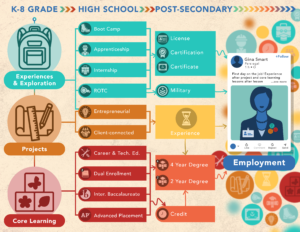Innovation in Education Is More than a New Approach

By Vadim Polikov
Innovation in education represents a significant challenge for educators, curriculum providers, technology providers and governments alike. A whole host of attempts and philosophies seek to reinvigorate U.S. education systems, from blended and personalized learning techniques to debates about types of schools and the role of testing in learning. Some of them work, some experience fleeting success and others fail. More often than not, data and best practices are not widely disseminated.
My approach to innovation focuses on a few core concepts that go beyond just a new approach. As a research scientist, I firmly believe in using original academic research to validate hypotheses and systems to make implementation of new concepts easy for educators.
Prove the Hypothesis and Share the Data
When I considered the idea of using short, curriculum-based education games as a means to help students better engage in class, master the concepts behind their lessons and improve their test scores, my first question was “Will it really work?” My instinct was to go to the literature — surely someone has tested this already!
Unfortunately, to my surprise, I discovered that there is not a great deal of high-quality academic research on the topic. Further, the data that was available often dealt with opinions, approaches that were academically interesting but impossible to implement, and low sample-size (single classroom) case studies.
So I sought out an academic partner who would help me prove, or disprove, my hypothesis. Together with a team at Vanderbilt University, we tested short curriculum-aligned games with more than 1,000 students in seven states in diverse physical and socioeconomic environments.
The results demonstrating positive student outcomes were substantial enough for me to start a new company based on the findings. But more than the company and its offering, the biggest contribution to education I can offer is the study itself – the soon-to-be-published academic paper “Substantial Integration of Typical Educational Games into Extended Curricula.” With its findings, my hope is that other educators, innovators and policymakers can make progress toward stronger academic practices.
Original research is critical to our education system’s overall success. I firmly believe that proving—or disproving—hypotheses with strong rigorous research is the best way to move education forward.
Easy Implementation Is An Innovation, Too
One of the most crucial aspects of making a new approach accepted within education is the concept of ease of use. Educators’ time is at a premium, so providing them with something that is easy to use and familiar has a far greater chance of being implemented.
This is the biggest criticism I have heard of new education content and technology tools. Teachers and schools struggle to implement them and spend way too much time getting up to speed.
Provide Proof and Make It Easy
Innovation is always exciting. However, success lies in the deeper level of execution. Concepts need to be proved, preferably with real rigorous research. Sharing that data helps us move forward in a more rapid and, frankly, successful manner.
To succeed across America, we as innovators have to focus on bringing our ideas to the education marketplace in a manner that makes it natural and easy to implement. When it is easy and obvious, the barriers to widespread acceptance are much lower.
I believe these two additional facets of innovation make great ideas that much more successful in education. What do you think?
For more, see:
- How to Keep EdTech Tools from Gathering Dust
- 8 Principles of Productive Gamification
- Designing Successful Gamification Practices in Higher Education
Vadim Polikov is the founder and CEO of Legends of Learning. Follow them on Twitter: @legendlearning
Stay in-the-know with all things EdTech and innovations in learning by signing up to receive the weekly Smart Update.







0 Comments
Leave a Comment
Your email address will not be published. All fields are required.